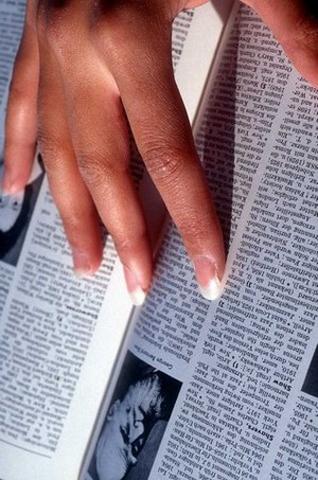People
The Burden & Blessing of Learning Disabilities
by PARVEEN KAUR DHATT-SANGHA
Sitting in my office, I could see "Jefferson" - it's a name I have given him for the purpose of this article - pacing restlessly outside, from the corner of my eye; I knew he wanted to share some information, probably for the sixth time today.
Jeffery calls me, leaves voicemails and e-mails sometimes with the most mundane details and questions I have answered many times over. I begin to wonder about my own complicity and think to myself if I should just allow him to wait, to learn to be patient, but his eagerness grabs my attention and I wave him into my office.
Before taking a seat he excitedly told me he just got an A+ on an assignment for a class he had been struggling with.
"Wow!" I exclaimed, "good for you, I knew you could do it".
While this type of conversation, albeit a bit clichéd, is commonplace for educators, this particular student's academic success depended on this positive reinforcement.
Jefferson, you see is not just any student; he has a learning disability ("LD") and has struggled with reading and writing all his life. The tasks that many of us have acquired with relative ease are daunting, anxiety provoking and purposeful and most of the time all-consuming for students with LD.
What is a Learning Disability?
This was exactly the question I sought to answer all those years ago in preparation for a job interview for working with students in a community college. Prior to immersing myself in this world, my understanding of LD was very limited and probably a very stereo-typed one.
Certainly, learning disability is not a term we often hear in our community, nor is it a prevalent word used in most immigrant communities that I know of. However, learning disabilities do exist without racial, ethnic and gender boundaries. Regardless of socio-economic status, languages spoken or exposure to a formal education. Students who are underprepared or come from a different language background may have some of the same surface problems with spoken or written language that LD students have, however, the underlying causes are different.
What we do know about LD is that they are lifelong, neurological in nature, and are diagnosed by a psychometrist or psychologist. Individuals must also be within the average/ above range of intelligence to meet these diagnostic criteria. The bare bones definition is 'difficulty processing language, whether in the written or verbal form'.
Dyslexia is a common type of learning disability which is widely recognized but least understood. Persons who are dyslexic often omit words, transpose letters and sounds. For example, while reading, they see the letter ‘s' as the number ‘5' or see the ‘p' as a ‘q'. While this perceptual difficulty will always remain, there are many compensatory strategies that people with dyslexia can use. Tom Cruise is one really good example; he has dyslexia and learns his script by listening to a tape recorder.
While some of these errors or omissions in reading are common amongst those just beginning to read in the primary years, their persistence into high school and college are indicative of an underlying problem.
I have been working as a Learning Strategist at Centennial College in Toronto for the past 8 years. All of my experience and knowledge has been gleaned through listening to student's challenges and triumphs in the academic world. Their stories of being labeled ‘dumb', ‘lazy', ‘stupid', etc., by some educators and parents who, lacking knowledge of the topic, have also offered very little support. The emotional baggage that then goes along with the label can sometimes take a lifetime to unravel because some students have learned to internalize their failure in school to life itself.
This is one of the challenges of LD. It is important to bring these issues to the fore, but it is easier to discuss all the success stories that I have heard within the confines of my office.
Last week a student came in, showed me his police badge and offered me his business card. He had previously been enrolled in two different college programs and unable to get through some of the reading intensive courses required to graduate. When I took the badge, I instinctively held it up to my nose, the smell of a newly minted police officer! It is these moments that I relish my job; tears of joy flowed from my eyes.
The student who tried to follow the model route through college tried and tried again, found success in a different manner!
Jefferson, as I affectionately called him, has now graduated from his program after spending 5 years in college. He usually calls me every week to 'check-in' and update me on his successes in finding a job. I think I will rest easier when he is able to do just that, our journey together is not over yet!
In relaying these stories, I think about the notable and celebrated ‘failures' in life:
Thomas Edison.
Einstein who learned how to read at the age of 9 was considered slow by his teachers.
Walt Disney.
Winston Churchill.
Ingvar Kamprad - the founder of IKEA - developed his empire around his dyslexia.
Would we have light today if not for Edison, would Mickey Mouse/ Disney World exist if not for Walt, and finally, would the Theory of Relativity be known!
The commonalities amongst these varied personalities are that they all succeeded because - not inspite - of their LD, they learned to adapt and think in different ways to overcome their challenges. So my work with students is to help them bring out their ‘inner' Einstein, capitalize on their strengths to compensate for areas that need more work.
[Parveen Kaur Dhatt-Sangha, M.Sc., is a Learning Strategist at The Centennial College in Toronto, Ontario, Canada.]
February 20, 2010
Conversation about this article
1: Tejwant Singh (Las Vegas, Nevada, U.S.A.), February 20, 2010, 3:12 PM.
Parveen: Thanks for sharing the dark labyrinths of people's lives that people like me can not even fathom. But people like you help these people find the light within by offering them a glimmer, a shoulder to lean on, a listening ear, an eye contact, and many more things that they have been hungry for quite unknowingly. To call it a calling would be an insult to your profession. I would call this a mission with a grit. You do not give up on them because you do not want them to do the same. So, in other words, they end up offering a lot more than they would ever be able to realize while receiving. Thanks once again for sharing this wonderful daily journey of yours.
2: Irvinder Singh Babra (Brampton, Ontario, Canada), February 22, 2010, 8:12 AM.
Caring for loved ones burdened by various disabilities is one of the areas I have been involved for the last 14 years. Praveen Kaur's article underlines the need to learn about all kinds of disabilities and how to meet the extra-ordinary needs of over 65 million people in Canada and U.S.A.
3: Chintan Singh (San Jose, California, U.S.A.), February 22, 2010, 11:10 AM.
What a great story and what a terrific seva you are doing from your profession. As a parent of a pre-schooler, I have often come across instances where I have feared my own child might have an LD. Although cannot say for sure if he does or does not, but your article is a great motivation to me and I am sure to other parents. How does one get involved or participate in helping inform society and parents of LD students how to adapt to it? How can a commoner help without a professional background and education like yours?
4: Parveen Kaur Dhatt (Brampton, Ontario, Canada), February 23, 2010, 11:40 AM.
Thank you for all of your kinds words and encouragement. S. Chintan Singh ji, there are tons of resources available online; for example, ldonline.com or ldaca.org (particular to your state) which provides all the information you need about LD. Please keep in mind that with pre-schoolers, it is premature to diagnose an LD, this usually happens when a student is in the later primary grades. So, probably nothing to worry about. However, something to be mindful of, if you do not notice an improvement with time. The best thing a parent can do, regardless of LD, is to help your child become a voracious reader; this will help to circumvent some of the challenges. Much work is needed in our community to spread the word about disabilities. I was hoping that by writing this article I would at least try to get the ball rolling. Part of my job is to train the college community about disabilities and so I facilitate sessions for faculty and staff on a regular basis. Lately, I want to do seva within our community about disabilities since we really have not created a platform to talk about this as yet. Let's all get together and discuss how we can spread the word. I am open to public speaking and training people on how to work with students with disabilities. If you think I can be of help, please feel free to contact me at pdhatt-sangha@centennialcollege.ca
5: Baljit (Brampton, Ontario, Canada), March 02, 2010, 12:21 AM.
Helping those in need is a seva that many who do this, humbly do not recognize in themselves. Listening, sharing, understanding, providing information and guidance is so essential to an individual who struggles with any disability. A very nice look into your professional life, and I'm sure your daily service does not stop there ... Good for you.






